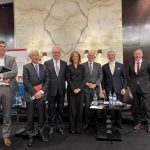Portugal is losing talent through high taxes and low salaries
The dean of Portugal’s business school Nova SBE says that Portugal is losing talent because of low salaries and high taxes.
In an Intervew with TSF radio, Daniel Traça says the Government’s priority for the next few budgets should be to reduce the tax burden on companies, but also warns that if it doesn’t also reduce taxes on some higher incomes, then Portugal will “continue to have problems maintaining and attracting talent”.
“In terms of IRS tax, particularly at higher levels, Portugal is losing talent because salaries are so low, and we have to look at this dynamic, not solely from a social point of view”, said the dean of the educational establishment at Carcavelos, near Lisbon.
Taxes also needed to be lowered for families facing the most difficulties. The more talent we retain, both foreign and Portuguese, the more buoyant the economy will be, the more productivity will increase, and the greater the possibility of increasing salaries for everyone, including those on the lowest salaries”, said the dean of Nova SBE.
Professor Traça also emphasised responsibility in public policies, and how the Recovery and Resilience Programme money (RRP) would be used and spent, and says the return on investment grants should be quantified and monitored.
“We had elections a week ago and a surprising PS party absolute majority, and this stability is important, particularly in terms of continuity because we won’t be starting from scratch. But it (the election majority) should not be seen just from a political point of view, of having the main players there for the next four years, but from thee vital elements.
First, RRP allocation must be accountable, both in terms of application and results.
Second, policy stability for investors. Investors intending to invest in Portugal need to know where they stand in terms of legislation and taxes, and if these are likely to change in the medium term.
Third, ideological stability, which he says hasn’t really existed over the past four yeas when everything was negotiable and changed according to the budget.
“Now we have stability at this level, and this will allow for more coherency when defining public policies, and in a few years time we’ll be able to evaluate the results and apportion responsibilities — which is something that often fails in Portugal,”, he said.
Professor Traça said Portugal had to stop thinking in the medium term, and that while recovery and getting growth at 5% or more was important, he reminded that sustained growth in the long term would be hard
“Portugal was already in a difficult situation before the pandemic, without long term prospects in terms of productivity and the capacity to grow in the long term in comparison to other European countries. We’re growing 4.8% now because (during the pandemic) we didn’t grow at all,” said the dean.
“We have to have a logic of long-term and sustainable growth” he stressed, adding that these problems had existed since the turn of the century and got worse in the second decade.
Daniel Traça explained to TSF that the bazooka funds need to be attributed and monitored in function of how these would help them improve productivity, and it was this that would increase salaries.
“We haven’t had an average long term growth of 1.5% over the past 10 years. It’s very low when compared to Ireland, Lithuania, and Estonia which have grown 4% per year, and it is up to companies to ensure such growth rates,” he said.
His recipe for change is similar to those of other liberal, centre right and right wing economists, academics, and industrial and company representatives in Portugal.
Reform justice, reform the State, attract more overseas investment to Portugal, and foster stability. Now the Government has the conditions, he argues, to make real changes and take measures.
“The diagnosis has been made and now we have the opportunity to take measures. The Government has the long term to think about these things, and (whether and how) it will plant a seed to determine how the decade (2020-2030) will be different from 2000-2019. That’s the challenge and the opportunity,” he said.










